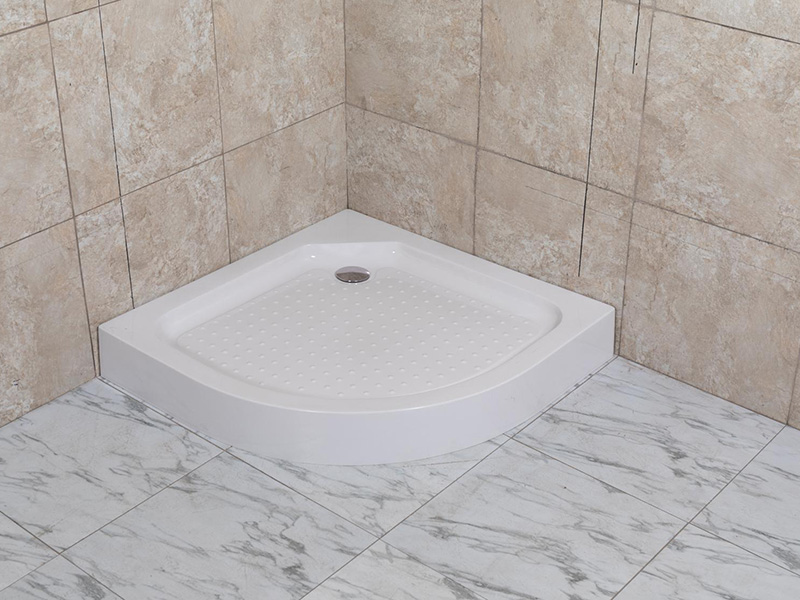Product Consultation
Your email address will not be published. Required fields are marked *
The antibacterial and mildew resistance of shower trays is an important factor in ensuring a hygienic and comfortable shower experience. Shower trays are exposed to water, moisture, body dirt, etc. for a long time. If they are not protected, they are prone to breeding bacteria and mold, causing odor, stains and health problems. In order to effectively ensure the antibacterial and mildew resistance of shower trays, manufacturers usually use the following methods:
Antibacterial coating or surface treatment
Many modern shower trays are coated with antibacterial coatings or special surface treatments, such as nano-antibacterial technology. Antibacterial coatings can effectively inhibit the growth of bacteria, mold and other harmful microorganisms, preventing them from attaching and multiplying on the surface of the shower tray. These coatings are generally harmless to the human body and can maintain their effectiveness for a long time.
Some shower trays use silver ion technology, which has a natural antibacterial effect and can effectively kill bacteria and mold and prevent them from multiplying on the surface.
Anti-mold treatment technology
Anti-mold treatment is an important aspect of shower tray surface treatment, especially for places where water is easy to accumulate, where mold is easy to grow. Many shower trays use anti-mold materials or coatings to help prevent the growth of mold. For example, quartz and acrylic shower trays are treated with special mildew-resistant coatings to reduce moisture damage to the surface, thereby reducing the growth of mold.
Some high-end shower trays also use anti-mold resin materials, which have natural mildew-resistant effects and can effectively keep the shower tray dry and reduce the growth of mold.
Smooth surface design
The smoothness of the shower tray surface plays an important role in antibacterial and mildew-resistant. Smooth surfaces are not easy for moisture, dirt and bacteria to adhere, thereby reducing the growth of bacteria. High-quality acrylic, quartz and ceramic materials are finely polished, and the surface is very smooth, and water droplets are not easy to stay, which can effectively reduce the growth of bacteria and mold.
Anti-fouling design
In addition to antibacterial and mildew-resistant treatments, some shower trays also use anti-fouling designs to prevent the accumulation of stains such as scale, oil stains, and soap stains. These stains not only affect the appearance, but also provide a source of nutrition for the growth of bacteria and mold. Anti-fouling design can ensure that the shower tray remains clean for a long time, thereby reducing the possibility of bacterial growth.
Good drainage system design

Drainage system design is one of the key factors in preventing mold growth. Many shower trays are equipped with built-in quick drain systems to ensure that water flows out quickly and does not accumulate at the bottom of the tray. If the water does not flow smoothly, the accumulated water may become a breeding ground for mold. The quick drain system can ensure that the surface of the shower tray is dry and reduce water retention, thereby inhibiting mold growth.
Regular cleaning and maintenance
Although antimicrobial coatings and anti-mold treatments can play a certain role, the antimicrobial and anti-mold properties of shower trays still need regular cleaning and maintenance. Consumers should regularly use a suitable detergent to clean the surface of the shower tray, especially around the drain where water and scale are likely to accumulate. Keeping the shower room ventilated is also an important measure to prevent mold growth.
Material selection
Acrylic material: Acrylic shower trays usually have good antimicrobial properties because their surface is not easy to absorb bacteria and mold. And antimicrobial ingredients can be added to acrylic materials during the manufacturing process to further enhance their antimicrobial properties.
Quartz material: The surface of quartz is denser and is not easy to breed bacteria and mold. Shower trays made of quartz stone are generally waterproof and antibacterial.
Ceramic material: Ceramic shower trays are generally also antibacterial, and the smooth surface is not easy to breed bacteria. Ceramic surfaces are usually treated with special coatings to help enhance the antibacterial and mildew-proof effects.
The antibacterial and mildew-proof properties of shower trays are achieved through a variety of methods, including antibacterial coatings, mildew-proof treatments, smooth surface designs, good drainage systems, and regular cleaning. When choosing shower trays, consumers should give priority to those with antibacterial, mildew-proof treatments, and fast drainage designs to ensure hygiene and comfort during long-term use. At the same time, keeping the shower environment dry and ventilated, as well as regular cleaning and maintenance, can also effectively ensure the antibacterial and mildew-proof properties of the shower tray.
What are the requirements for cleaning and maintenance of the Sliding Shower Enclosure?
How to match the design style of Freestanding Bathtub with the home style?
Your email address will not be published. Required fields are marked *

Keep up-to-date with what’s new at D-MAN
Keep up-to-date with what’s new at D-MAN
No.12 Fuziling Road, Nanling Economic Development Zone, Wuhu City
![]() Tel: +86 13967167585
Tel: +86 13967167585
![]() E-mail: [email protected]
E-mail: [email protected]
Copyright 2023 Anhui D-MAN Smart Home Co., Ltd. All Rights Reserved Shower Enclosures Manufacturers Shower Room Design Custom


 English
English Français
Français عربى
عربى